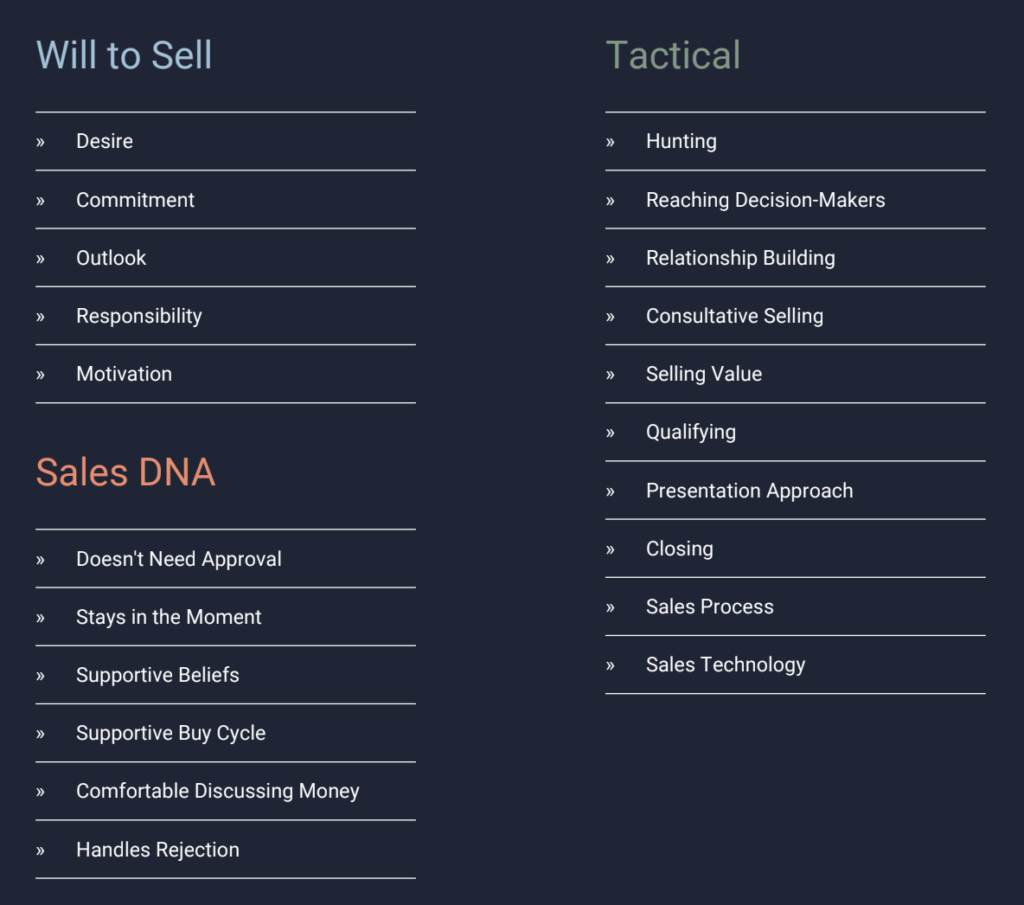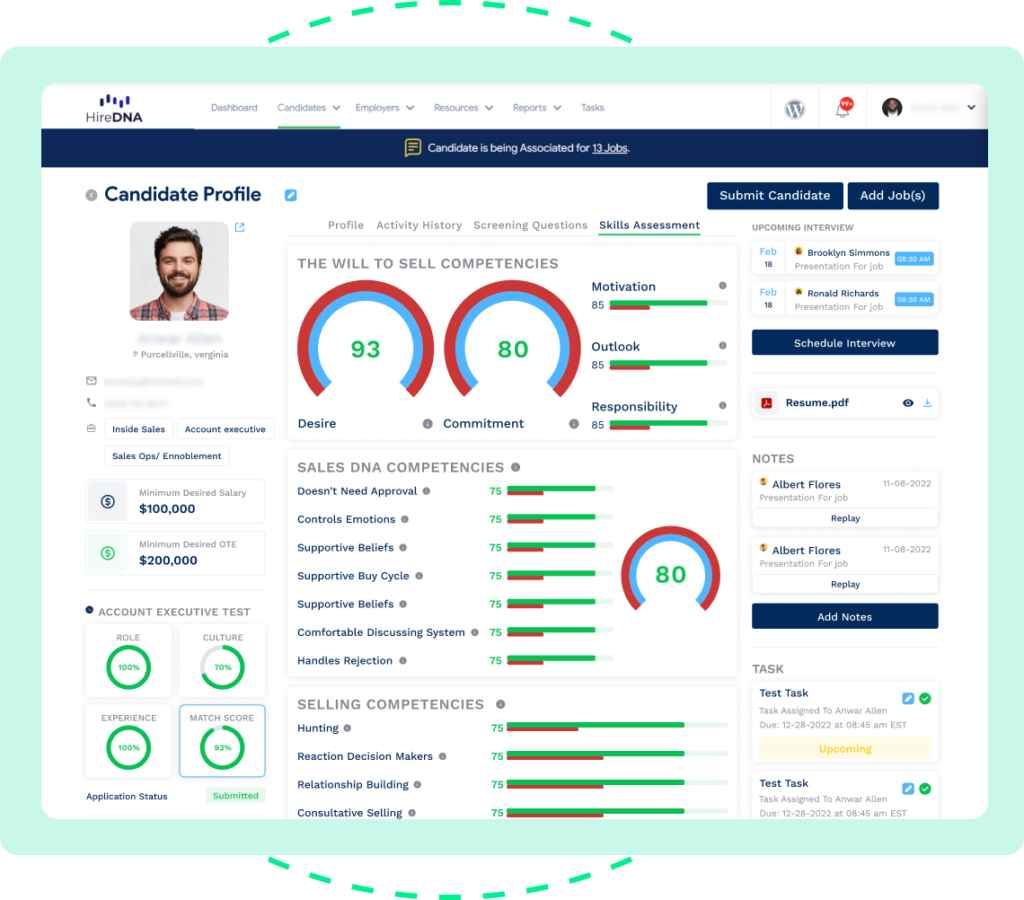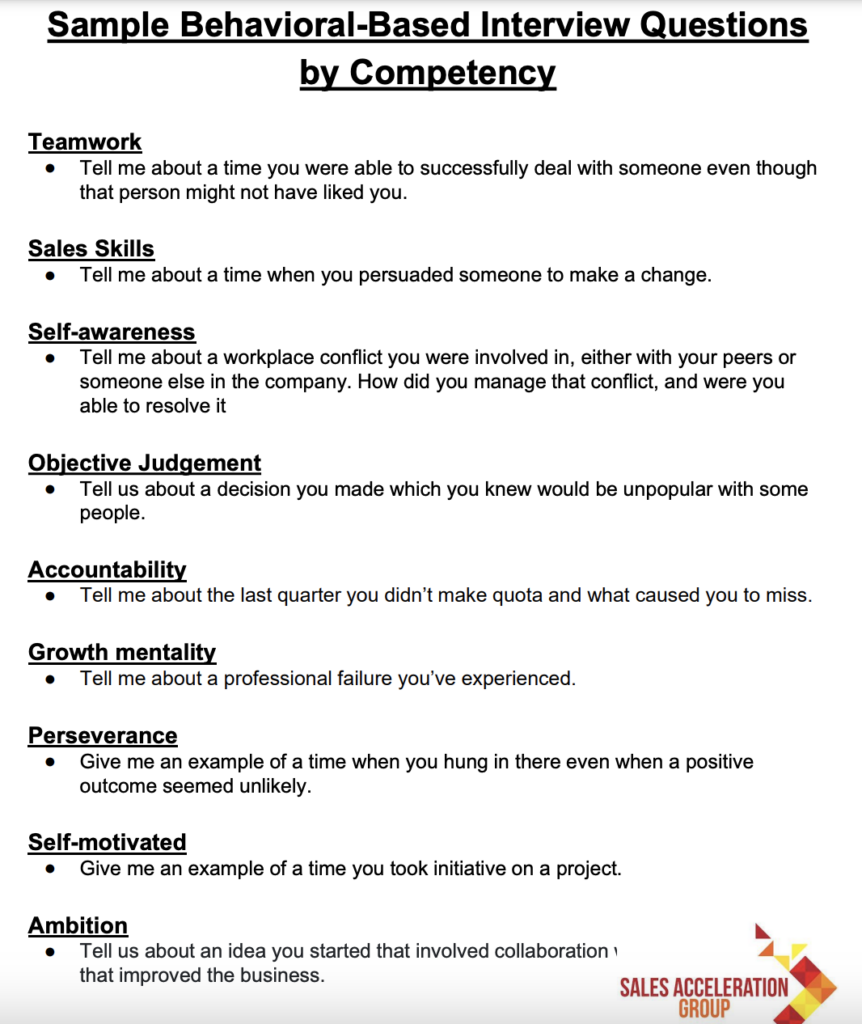No matter how skilled, experienced, or flat-out amazing a salesperson is, there’s always room for improvement. For perspective, studies have found that companies that invest in informed sales coaching see 8% more annual revenue, a 28% higher win rate, and 88% more productivity.
But how do you decide which specific areas of sales coaching to focus on?
For this post, I’d like to share the three core areas we base our evaluation process on for existing sales employees to facilitate optimal coaching and development programs.
3 Core Areas for Informed Sales Coaching
Let me start by saying there are a nearly endless number of factors that can impact a salesperson’s performance. Everything from product knowledge to negotiation skills to sales technology comprehension plays a role in a rep’s results.
But to streamline sales coaching, there are three core areas that we zero in on:
- Will to Sell
- Sales DNA
- Tactical competencies
“Will to Sell measures an individual’s sales-specific drive to succeed, Sales DNA measures the core underlying beliefs and actions that either support or limit sales success, and Tactical Competencies measure skills and abilities necessary throughout the sales lifecycle.”
Within each area are individual competencies that go more granular. With Will to Sell, for example, there’s desire, commitment, outlook, responsibility, and motivation. Here’s a full breakdown.
The key to truly understanding where a rep is currently at and how to deliver the best sales coaching starts with assessing each of these core areas and quantifying the results. In other words, it’s all about the data.
Once you’re armed with this information, you can customize your sales coaching accordingly to address their weaknesses and develop better overall habits.
With that said, let’s fully unpack the three core areas for informed sales coaching and look at how you can objectively analyze an existing rep’s performance.
Will to Sell
Having a strong Will to Sell is an essential precursor to success. You could argue that regardless of how knowledgeable and skilled a rep is, they likely won’t reach their full potential without the Will to Sell.
Again, measuring this involves analyzing five main competencies:
- Desire
- Commitment
- Outlook
- Responsibility
- Motivation
Here’s an example of how these competencies can be objectively measured using an assessment like the Objective Management Group Sales Assessment.
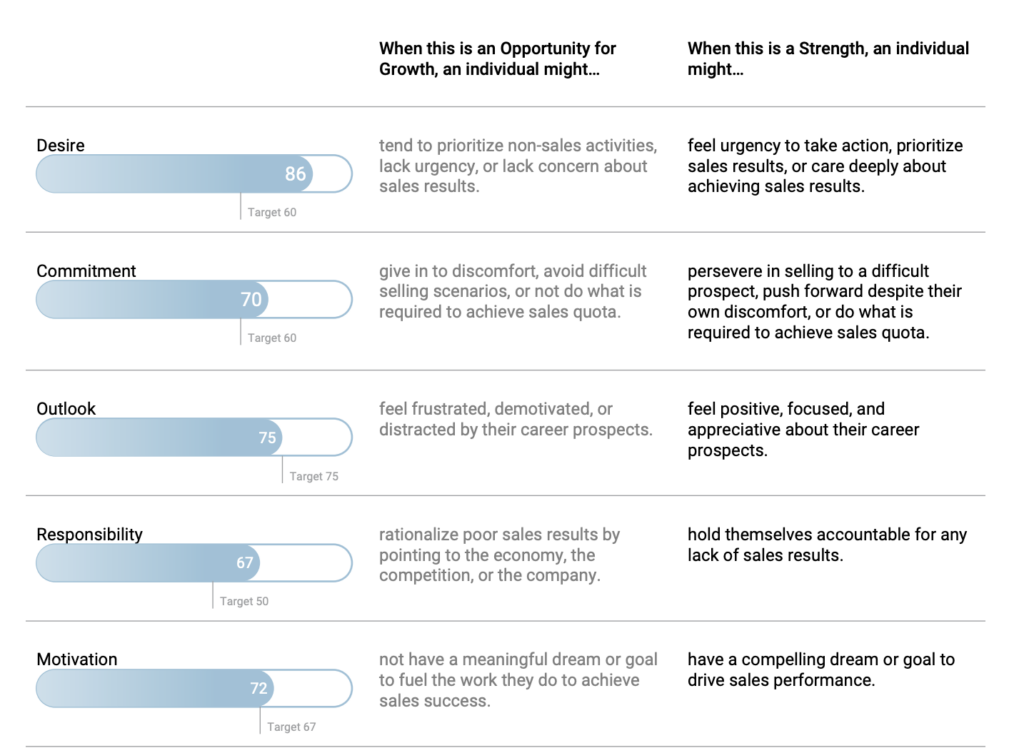
In this example, a rep scored:
- A score of 86 for desire
- A 70 for commitment
- A 75 for outlook
- A 67 for responsibility
- A 72 for motivation
By these numbers, the rep meets or exceeds their target for each competency. However, considering that the rep barely reached their target of 75 for outlook, that would be the primary area of focus for sales training.
This is only a mock example, of course, but it shows which specific competencies are most important with the Will to Sell and how you could use data to objectively assess those competencies.
Sales DNA
The next core competency is what we call Sales DNA, “which measures a salesperson’s beliefs and actions that support or limit success in sales. Salespeople are often unaware of how their biases can negatively impact their interactions with customers.”
Under the umbrella of Sales DNA are six core competencies:
- Doesn’t need approval
- Stays in the moment
- Supportive beliefs
- Supportive buy cycle
- Comfortable discussing money
- Handles rejection
Here’s an example of how these competencies could be evaluated objectively.
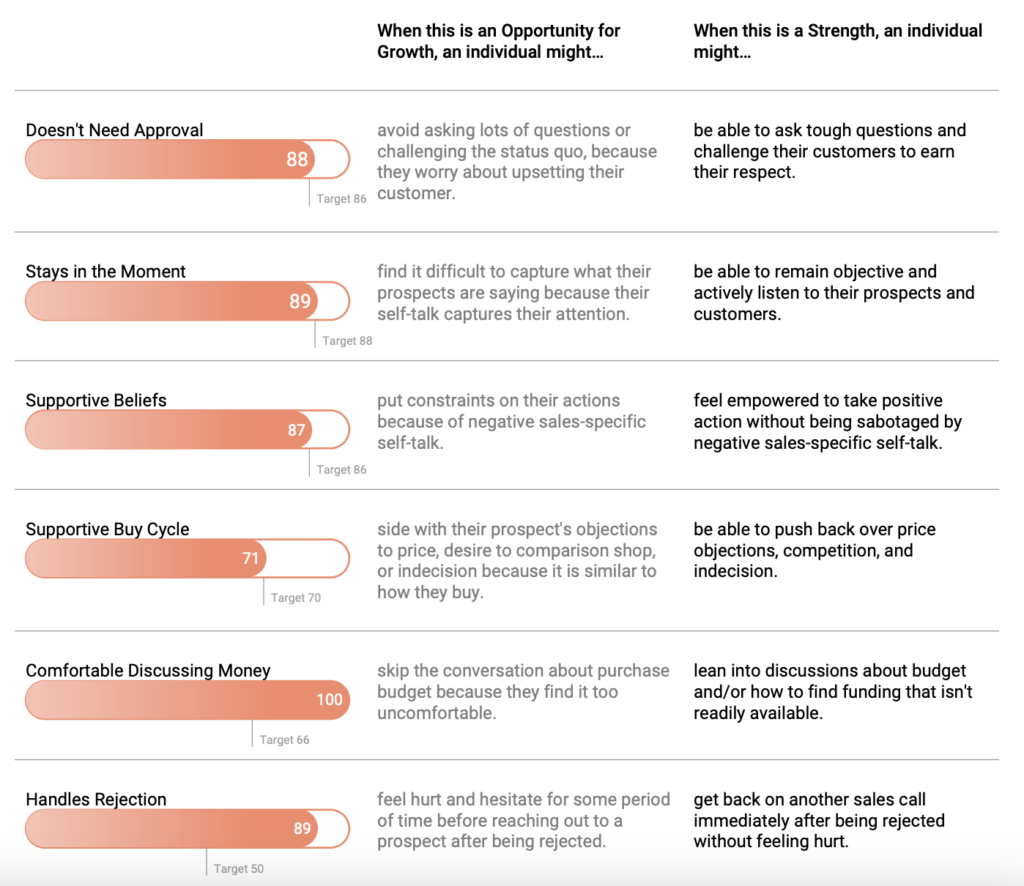
According to the results, this salesperson exceeds their target in all competencies. However, stays in the moment, supportive beliefs, and supportive buy cycle are just barely above target, indicating that these could potentially be areas of focus for informed sales coaching.
Tactical
The third and final area is Tactical, which includes several competencies, including:
- Hunting
- Reaching decision-makers
- Relationship building
- Consultative selling
- Selling value
- Qualifying
- Presentation approach
- Closing
- Sales process
- Sales technology
Here’s an example of how you could measure a salesperson’s Tactical competencies.
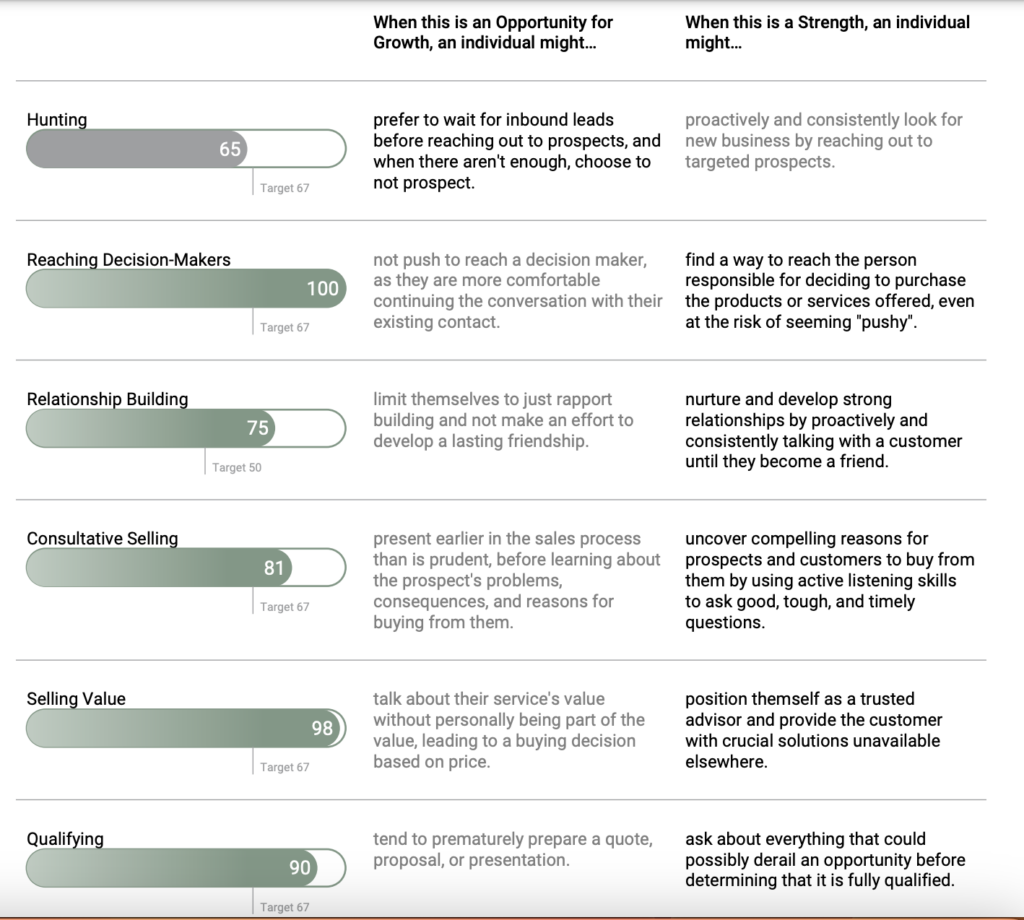
Among the first six competencies, hunting is the only one that’s below target. That means it would be a critical area of focus for sales training. Otherwise, everything looks quite good.
As for the other four remaining competencies, closing, sales process, and sales technology scores are all lower than they should be. Therefore, those would also be important points of emphasis.
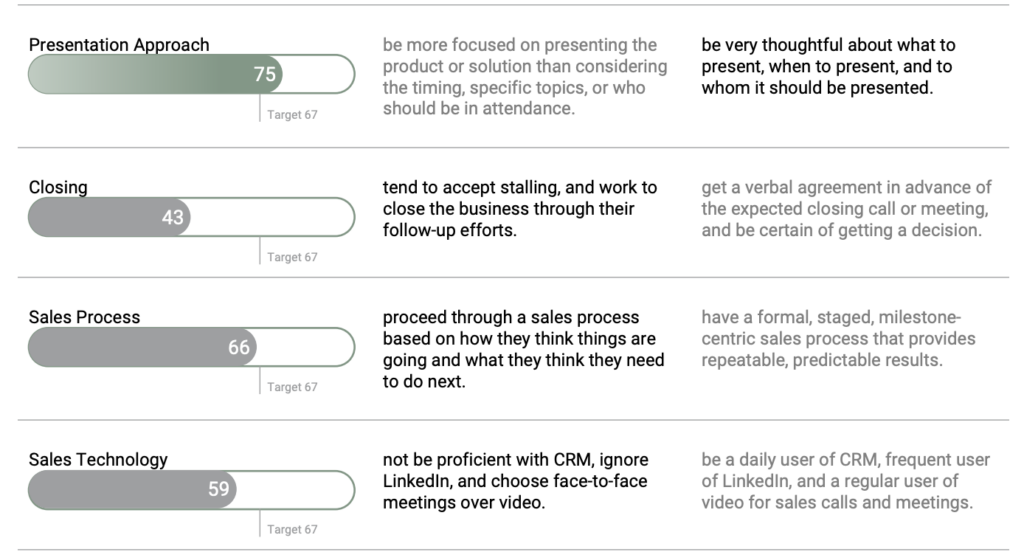
Putting the Pieces Together
Now let’s zoom out and come up with a tailored approach for the mock salesperson from this example.
According to the results, a sales trainer would want to focus on the following:
- Will to Sell – Outlook
- Sales DNA – Stays in the moment, supportive beliefs, and supportive buy cycle
- Tactical – Hunting, closing, sales process, and sales technology
Keep in mind that the competencies from Will to Sell and Sales DNA were all on target or better, which means they wouldn’t be top priority. The four Tactical competencies, however, were all below target, which means they should receive top priority.
From there, the sales coaching team could come up with an individualized game plan to improve these areas of weakness and get the rep to where they need to be. Again, this is an arbitrary example, but it clearly shows which specific competencies you should analyze and how objective data can be utilized to fully understand a rep’s current abilities and figure out the best approach for enhancing their performance.
Optimizing Your Talent with Informed Sales Coaching
Sales coaching should never take a one-size-fits-all approach. Every rep is different, with their own unique strengths and weaknesses, and each is at a different stage in their sales career.
That’s why you need to 1) identify core competencies to focus on and 2) objectively measure how a rep is currently performing in those areas. From there, you can tailor your sales coaching to laser focus on the areas that need the most improvement. Also, you’ll know where a rep is thriving so you can refine those areas even more to help them reach their absolute peak potential.
To learn more about the sales skills assessment featured above, check out the Objective Management Group Sales Assessment.

